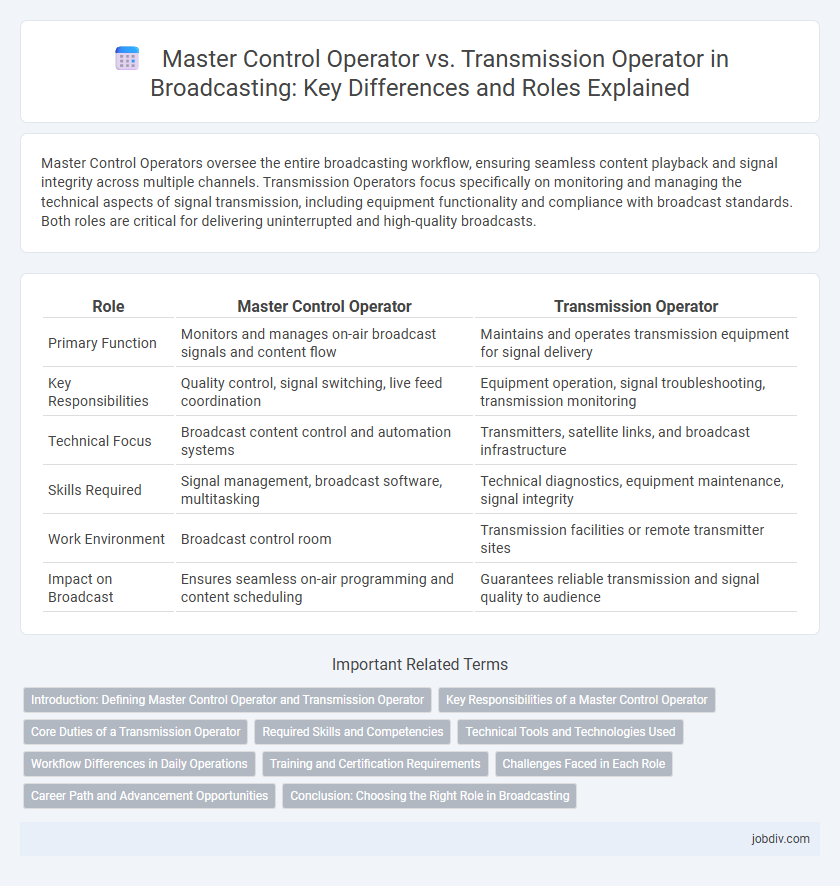Master Control Operators oversee the entire broadcasting workflow, ensuring seamless content playback and signal integrity across multiple channels. Transmission Operators focus specifically on monitoring and managing the technical aspects of signal transmission, including equipment functionality and compliance with broadcast standards. Both roles are critical for delivering uninterrupted and high-quality broadcasts.
Table of Comparison
| Role | Master Control Operator | Transmission Operator |
|---|---|---|
| Primary Function | Monitors and manages on-air broadcast signals and content flow | Maintains and operates transmission equipment for signal delivery |
| Key Responsibilities | Quality control, signal switching, live feed coordination | Equipment operation, signal troubleshooting, transmission monitoring |
| Technical Focus | Broadcast content control and automation systems | Transmitters, satellite links, and broadcast infrastructure |
| Skills Required | Signal management, broadcast software, multitasking | Technical diagnostics, equipment maintenance, signal integrity |
| Work Environment | Broadcast control room | Transmission facilities or remote transmitter sites |
| Impact on Broadcast | Ensures seamless on-air programming and content scheduling | Guarantees reliable transmission and signal quality to audience |
Introduction: Defining Master Control Operator and Transmission Operator
A Master Control Operator manages the overall broadcast signal flow, ensuring seamless switching between programs, commercials, and satellite feeds within a television or radio station. A Transmission Operator focuses on maintaining and monitoring technical equipment that transmits broadcast signals, including transmitters, antennas, and satellite links. Both roles are critical for the uninterrupted delivery of high-quality content to audiences.
Key Responsibilities of a Master Control Operator
A Master Control Operator oversees the comprehensive monitoring and quality control of all broadcast signals, ensuring seamless transmission and adherence to schedule. They manage content playback, troubleshoot technical issues in real-time, and coordinate with production teams to maintain compliance with broadcasting standards. Their role is critical for maintaining broadcast continuity and preventing signal disruptions across multiple channels.
Core Duties of a Transmission Operator
A Transmission Operator ensures the seamless delivery of broadcast signals by monitoring transmission equipment, troubleshooting technical issues, and coordinating with engineering teams to maintain signal integrity. They manage satellite feeds, fiber-optic connections, and backup systems to prevent outages and uphold broadcast quality. Unlike Master Control Operators who focus primarily on on-air content scheduling and switching, Transmission Operators concentrate on the infrastructure that transports the broadcast to viewers.
Required Skills and Competencies
Master Control Operators require strong technical skills in video signal flow, equipment troubleshooting, and monitoring broadcast quality to ensure seamless live and recorded content transmission. Transmission Operators must have expertise in satellite and fiber optic communication systems, signal routing, and regulatory compliance to maintain signal integrity across distribution networks. Both roles demand proficiency in real-time problem-solving, attention to detail, and familiarity with industry-standard broadcast automation software.
Technical Tools and Technologies Used
Master Control Operators utilize advanced automation systems, including video servers, routing switchers, and monitoring software to oversee entire broadcast workflows and ensure seamless content playback. Transmission Operators focus on transmitter control systems, satellite uplinks, modulation equipment, and RF monitoring tools to maintain signal integrity and manage broadcast transmission. Both roles rely heavily on real-time monitoring platforms and troubleshooting technologies to prevent downtime and maintain broadcast quality.
Workflow Differences in Daily Operations
Master Control Operators oversee the entire broadcast chain, ensuring seamless content playout by monitoring signals, managing live feeds, and troubleshooting technical issues. Transmission Operators primarily focus on maintaining signal integrity during transmission, adjusting equipment settings, and coordinating with satellite or cable providers to prevent service interruptions. Workflow differences highlight Master Control Operators' role in content management and quality control, whereas Transmission Operators concentrate on infrastructure and signal distribution stability.
Training and Certification Requirements
Master Control Operators typically require specialized training in video signal flow, broadcast automation systems, and emergency alert protocols, often supported by certifications such as the Society of Broadcast Engineers (SBE) Certified Broadcast Technologist (CBT). Transmission Operators focus on technical skills related to transmission equipment maintenance, satellite and microwave systems, and FCC regulations, with certifications like the SBE Certified Broadcast Networking Technologist (CBNT) being highly relevant. Both roles demand ongoing education to stay current with evolving broadcast technologies and regulatory standards.
Challenges Faced in Each Role
Master Control Operators face challenges such as ensuring seamless broadcast signal quality, managing live feeds, and troubleshooting technical failures to maintain uninterrupted programming. Transmission Operators encounter difficulties in monitoring transmission equipment, maintaining satellite uplinks, and handling regulatory compliance related to signal distribution. Both roles demand quick problem-solving skills to address equipment malfunctions and coordinate with technical teams under high-pressure situations.
Career Path and Advancement Opportunities
Master Control Operators typically oversee the entire broadcast feed, ensuring seamless program transmission and troubleshooting technical issues, which can lead to career advancement as Broadcast Engineers or Technical Directors. Transmission Operators focus more specifically on managing signal distribution and maintenance of transmission equipment, providing a specialized path toward roles such as Transmission Managers or Satellite Communications Specialists. Both positions offer growth through hands-on technical experience and certifications like SCTE or SBE, supporting upward mobility within broadcast operations.
Conclusion: Choosing the Right Role in Broadcasting
Master Control Operators ensure seamless broadcast signal integrity by managing technical equipment and monitoring live feeds, while Transmission Operators focus on the delivery and distribution of content across multiple platforms and networks. Selecting the right role depends on an individual's technical expertise and preference for either hands-on equipment control or overseeing signal transmission logistics. Both positions are critical for maintaining broadcast quality and require a strong understanding of broadcast technology and workflow management.
Master Control Operator vs Transmission Operator Infographic

 jobdiv.com
jobdiv.com